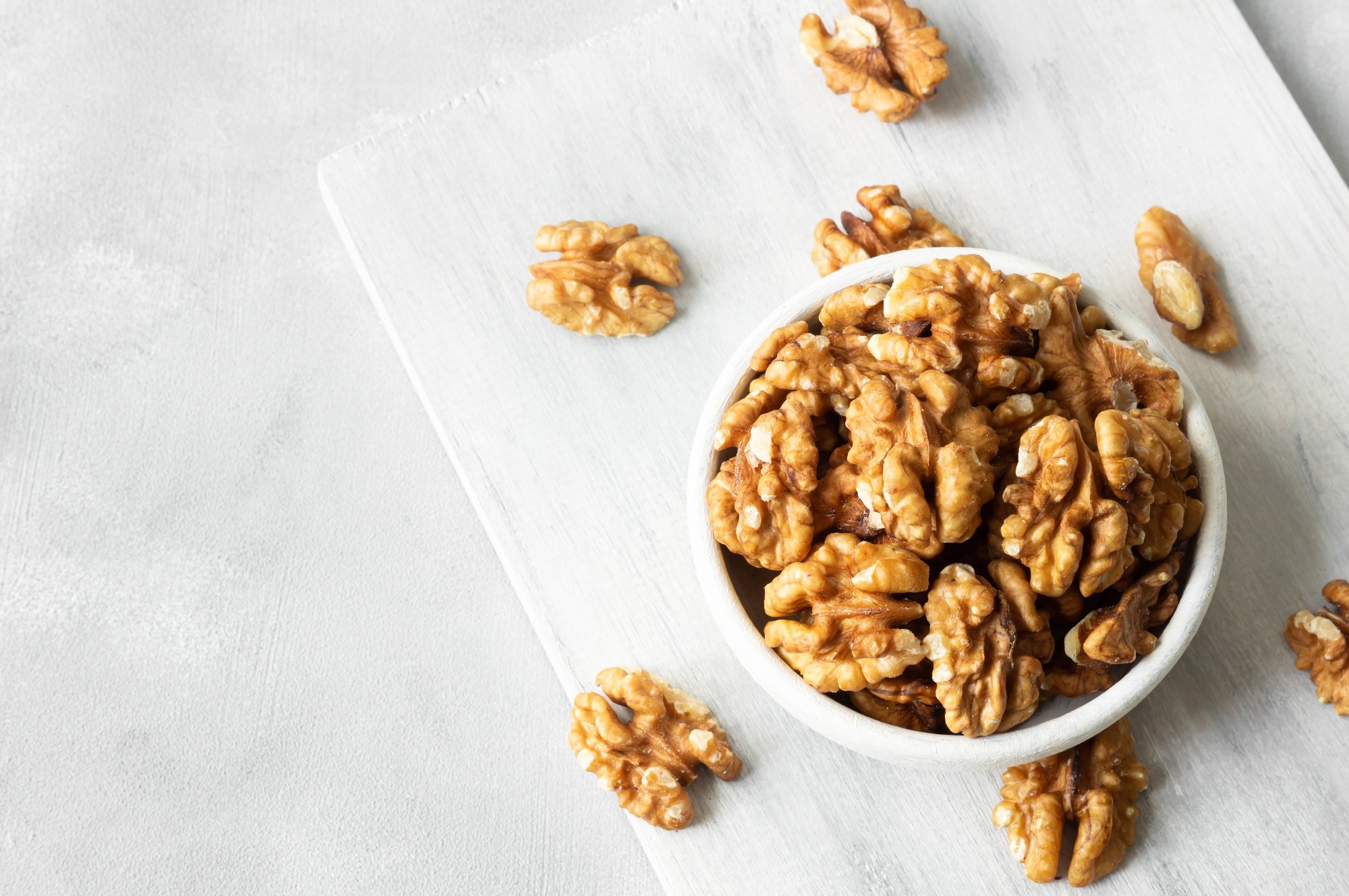Researchers tested whether a daily dose of walnuts could calm inflammation and boost antioxidant defenses, but the short trial found no measurable impact.
 Study: Could 4-Week Walnut Consumption Influence Oxidative and Inflammatory Status in Middle-Aged Adults with Cardiometabolic Risk Factors? Findings from a Randomized Controlled Trial. Image credit: Halil ibrahim mescioglu/Shutterstock.com
Study: Could 4-Week Walnut Consumption Influence Oxidative and Inflammatory Status in Middle-Aged Adults with Cardiometabolic Risk Factors? Findings from a Randomized Controlled Trial. Image credit: Halil ibrahim mescioglu/Shutterstock.com
Aging is a risk factor for obesity, type 2 diabetes mellitus (T2DM), cardiovascular disease (CVD), neurodegenerative diseases, and cancer. The underlying factor could be the aging-associated impairment of adipose tissue function that causes multiple metabolic abnormalities. A recent study published in Nutrients explores the potential impact of daily walnut consumption on this phenomenon.
Introduction
As the global population ages, the obesity epidemic has also risen, bringing a surge of cardiometabolic disorders. Metabolic syndrome is a cluster of risk factors for CVD that includes hypertension, dyslipidemia, obesity, and impaired glucose tolerance. With aging comes insulin resistance, visceral fat deposition, and chronic low-grade inflammation, caused by poorly functioning fatty tissue that releases unwanted signals.
Fatty tissue increases when a person constantly consumes more than the body’s energy needs. Overfilled fat cells hypertrophy and secrete inflammatory chemicals like interleukin-1β (IL-1β), interleukin-6 (IL-6), interleukin-8 (IL-8), and tumor necrosis factor alpha (TNF-α). The resulting systemic inflammation disrupts normal insulin sensitivity, which causes hyperglycemia and dyslipidemia.
Expanding fat depots become hypoxic. Combined with reactive oxygen and nitrogen species (ROS and RNS, respectively) from phagocytosis, this induces oxidative stress, which, in turn, worsens inflammation and drives insulin resistance. Chronic oxidative stress produces toxic oxidation products such as advanced glycation end-products (AGEs) and advanced lipoxidation end-products (ALEs), both of which contribute to metabolic syndrome progression.
Both chronic inflammation and oxidative stress promote the progression of metabolic syndrome. Individuals with high blood pressure have worse endothelial function in the presence of oxidative stress, which drives vasoconstriction and vascular damage.
Why walnuts?
Walnuts contain vitamins and minerals in addition to protein. They also contain polyunsaturated fatty acids (PUFAs) and other bioactive substances. These compounds act as antioxidants, anti-inflammatories, and anti-aging compounds. Compounds like ellagic acid and tannins in walnuts remove free radicals and regulate oxidative stress.
Ellagitannins from walnuts are converted to ellagic acid and urolithins, potent antioxidants and anti-inflammatory compounds. They activate the Nrf2/ARE pathway and boost antioxidant capacity by increasing the production of catalase, superoxide dismutase, and glutathione peroxidase, and directly neutralizing oxidizing molecules like ROS.
Walnut kernels are enriched in protein (18-24%), which yields an abundance of essential amino acids and low molecular weight amino acids. These help scavenge free radicals and modulate oxidative and inflammatory pathways. They are also required for the synthesis of certain neurotransmitters and regulate multiple metabolic pathways. Their bioactive metabolites possess anti-inflammatory, antihypertensive, and neuroprotective activity.
The current study aimed to understand whether walnuts had a short-term effect on inflammation in middle-aged people at high risk for metabolic syndrome. Thus, it seeks to advance over prior research that used long-term walnut use or focused on specific groups of people.
This is the first randomized controlled trial to examine the short-term use of walnuts for its impact on cellular oxidative and inflammatory status in middle-aged adults at risk of metabolic syndrome. The study included 22 participants (20 completed the study), with a mean age of 49.
Study findings
There was no statistically significant difference in antioxidant capacity after walnut consumption. Inflammatory cytokine levels, including IL-1β, IL-6, IL-8, and TNF-α, remained comparable between the walnut and control groups.
These results agree with some but not all earlier trials, perhaps because of differences in the testing methods and study design. Differences in the type of walnut formulation and the study population may also have affected the outcome. Bioactives, for instance, have stronger effects on people in poor health than on healthy people.
The lack of change in catalase activity contradicts other studies that showed increased catalase and superoxide dismutase activity with walnut consumption. This could indicate the need for personalized dietary interventions and research to understand how the genotype interacts with the diet to modify the outcomes.
Other researchers have reported reductions in IL-6 and TNF-α, but not in the current study. This could be due to the lower inflammation at baseline in this study and the short time frame.
Conclusions
This crossover trial is the first to examine how a short-term intake of walnuts affects inflammation and oxidative stress in middle-aged adults with risk factors for metabolic syndrome. No significant effects were observed during this study period, indicating that the trial was too short for noticeable changes.
Larger studies are required to ensure adequate power and a longer period of intervention. More sensitive or reliable inflammatory markers could also have been used.
“Such approaches may provide a more comprehensive understanding of the potential role of walnuts in modulating inflammatory responses across diverse populations.”
Download your PDF copy now!